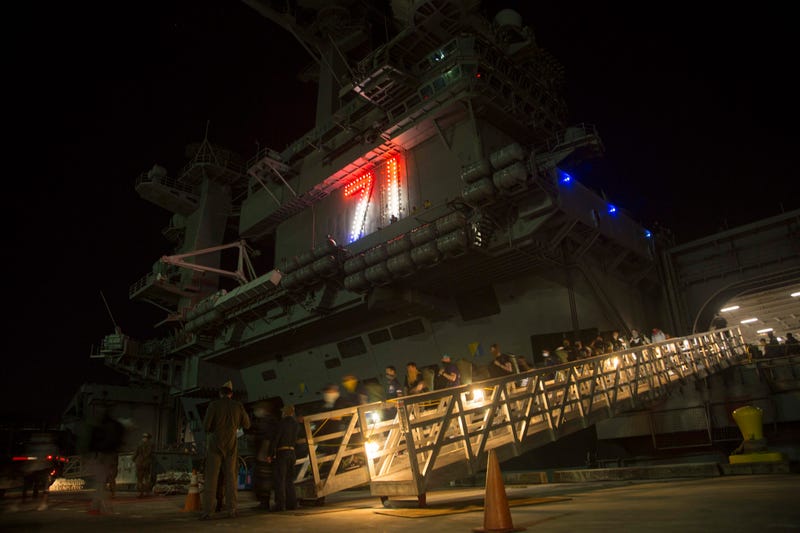
The USS Theodore Roosevelt's fight against coronavirus — without the captain who raised flags about her plight — is far from over. And it seems the same goes for her dismissed commander.
Recently surfaced information indicates that Capt. Brett Crozier sent his plea for help — the letter that would result in his dismissal — to far fewer people than was originally communicated. It has also now come to light that additional leaders on board the vessel wanted to sign their names to Crozier's letter, seconding the need for immediate assistance. For the sake of their careers, Crozier did not let them.
Crozier was dismissed by the now-former Acting Secretary of the Navy Thomas Modly on April 2 after a letter he wrote pleading for help from the Navy was leaked to the media. The letter described the situation onboard the USS TR and the risk to sailor's lives if immediate action was not taken.
Because he jumped the chain of command, which Modly argued was a personal act of betrayal against him, Crozier was dismissed.
Modly submitted a letter of resignation to Secretary of Defense Mark Esper five days later after facing backlash over dismissing Crozier — but not before he spent roughly a quarter of a million dollars on a trip to Guam so he could deliver a now very well-circulated speech explaining his decision to dismiss the captain.
The leaked speech about the leaked letter: Navy Sec slams USS TR captain
"If he didn't think, in my opinion, that this information wasn't going to get out to the public, in this day and information age that we live in, then he was either A, too naïve or too stupid to be a commanding officer of a ship like this," Modly said in the recording that will arguably go down in Naval history.
Now, the USS TR has largely been evacuated, close to 700 sailors have tested positive for COVID-19, and one of the vessel's sailors has died marking the first and only active-duty COVID-related death.
Navy IDs Arkansas sailor as 1st active-duty COVID-19 death
The New York Times reported this week that additional officers on board the vessel wanted to sign their names to the letter. Crozier, knowing the potential impact the letter could have on his career and the career of anyone who signed the letter did not allow additional officers to sign it.
On top of that, we now know that the letter — which Modly said was sent to at least 20 to 30 people outside of Crozier's chain of command — was sent to seven other Navy captains.
The Washington Post obtained the email Crozier's letter was attached to. It was addressed to Crozier’s commanding officer, Rear Adm. Stuart Baker, U.S. Pacific Fleet commander Adm. John Aquilino, and Naval Air Forces commander Vice Adm. DeWolfe Miller. Four others were included in the email. Not 17 to 27 others, as Modly suggested.
"I fully realize that I bear responsibility for not demanding more decisive action the moment we pulled in, but at this point my only priority is the continued well-being of the crew and embarked staff," Crozier wrote in the email obtained by the Washington Post. "I believe if there is ever a time to ask for help it is now regardless of the impact on my career."
Senior Department of Defense officials have said the reinstating Crozier as the USS TR's captain is not off the table.
Reinstating USS TR captain is 'on the table,' Esper, top Navy admiral say
"We've taken nothing off the table,” Secretary of Defense Mark Esper said in a CBS News interview last Friday. “My inclination is always to support the chain of command, and to take the recommendations seriously."
Chief of Naval Operations Adm. Mike Gilday — who launched an investigation specifically to determine what happened within the USS TR's chain of command that led to Crozier's four-page letter — told the Associated Press that no options, including reinstating Crozier, have been ruled out.
It has yet to be seen whether newly surfaced information regarding the captain's decision process will have any impact on considerations for his reinstatement.
As more and more sailors test positive and additional crewmembers are hospitalized, senior officials have also communicated that they do not believe there is any additional risk to national security or impacts on mission readiness.
USS Theodore Roosevelt sailor found unresponsive dies in ICU from COVID-194 more USS Theodore Roosevelt sailors have been hospitalized — 1 is in ICU
Both Vice Chairman of the Joint Chiefs of Staff General John Hyten and Deputy Secretary of Defense David Norquist insisted on Thursday that, regardless of the current state of the crew, the USS TR is still mission capable.
"It's fully capable of performing its mission if there was a need for it to deploy right away it would be able to do so," Norquist said, explaining that the vast majority of the 413 COVID-19 cases among the crew are either experiencing mild, flu-like symptoms or no symptoms at all. "If it had to go, it could."
"One carrier, as mighty as that carrier is and as amazing as that carrier is — it's a small fraction of the combat power that the United States brings to a puzzle," Hyten added.
As of Thursday morning, the Navy had reported 983 total cases of COVID-19. Across the Department of Defense, 2,889 active-duty service members have tested positive. The Navy currently outpaces all other branches of the Armed Forces with confirmed cases.
—
